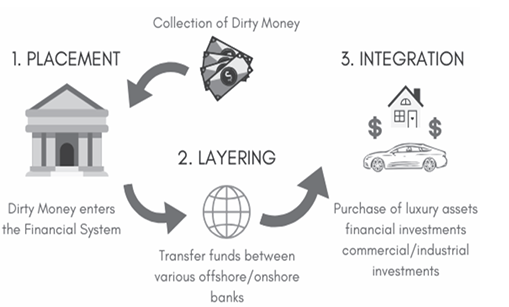Use of Bitcoin in Money Laundering
Money Laundering and the Use of Bitcoin
Bitcoin and other cryptocurrencies, due to their perceived anonymity, are often considered more susceptible to money laundering than traditional currencies. While Bitcoin transactions are recorded on the public blockchain, the identities of the participants are not explicitly revealed, creating a degree of pseudo-anonymity.
Typical Money Laundering Process
Why Bitcoin Is Attractive for Money Laundering
-
Anonymity:
- While transactions are public, user identities are not directly linked, offering a degree of anonymity.
-
Ease of Use:
- Bitcoin transactions are relatively simple to execute.
-
Borderless Transactions:
- Bitcoin allows for seamless international transfers without intermediaries.
-
Mixing Services and Offshore Exchanges:
- These services further increase the anonymity of transactions, and the ability to use exchanges in countries with lax AML laws is very attractive to criminals.
Methods of Money Laundering with Bitcoin
-
Mixing Services (Tumblers):
- These services combine a user's Bitcoins with those of other users, obscuring the transaction history.
- Explanation: By pooling and redistributing Bitcoins from various sources, these services make it difficult to trace the origin of funds.
- Impact: This allows criminals to obfuscate the trail of illicit funds.
-
Darknet Markets:
- These online marketplaces facilitate the buying and selling of illegal goods and services on the dark web.
- Explanation: Many darknet markets accept Bitcoin as payment, enabling anonymous transactions.
- Impact: The encrypted and difficult-to-trace nature of darknet transactions provides a safe haven for money laundering.
-
Peer-to-Peer (P2P) Transactions:
- Bitcoin allows for direct transactions between users, bypassing traditional financial institutions.
- Explanation: This lack of intermediaries makes it easier for criminals to move funds undetected.
- Impact: The added layer of anonymity in P2P transactions can be used to conceal the source and destination of funds.
-
Offshore Exchanges:
- Bitcoin can be bought and sold on exchanges located in jurisdictions with weak or non-existent anti-money laundering regulations.
- Explanation: This facilitates the transfer of funds across international borders, making it difficult to trace their origin.
- Impact: Criminals can exploit these exchanges to hide the source of their illicit wealth.
Important Considerations
-
Not Exclusive to Bitcoin:
- Money laundering is not unique to Bitcoin; traditional financial systems and currencies have long been used for this purpose.
- Explanation: In some cases, the transparency and immutability of Bitcoin transactions can make them easier to track than traditional currency transactions.
-
Need for Regulation:
- The adoption and enforcement of robust anti-money laundering (AML) regulations are crucial to combatting the use of Bitcoin and other cryptocurrencies for illicit activities.
- Explanation: Regulation will provide greater oversight and reduce the anonymity that criminals exploit.
-
Blockchain Analysis:
- Companies now exist that specialize in blockchain analysis. They are able to follow the flow of bitcoin transactions, and can often de-anonymize transactions. This is a growing field, and is being used by law enforcement agencies.


No Comments